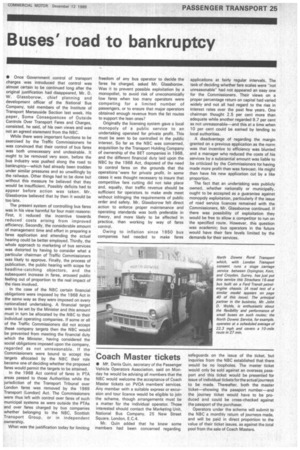Buses' road to bankruptcy
Page 27

If you've noticed an error in this article please click here to report it so we can fix it.
• Once Government control of transport charges was introduced that control was almost certain to be continued long after the original justification had disappeared, Mr. D. W. Glassborow, chief planning and development officer of the National Bus Company, told members of the Institute of Transport Merseyside Section last week. His paper, Some Consequences of Outside Controls Over Transport Fares and Charges, consisted, he said, of his own views and was not an agreed statement from the NBC.
While there were important functions to be exercised by the Traffic Commissioners he was convinced that their control of bus fares was both unnecessary and undesirable. It ought to be removed very soon, before the bus industry was pushed along the road to bankruptcy—which had already been trodden under similar pressures and so unwillingly by the railways. Other things had to be done but without this measure he believed that they would be insufficient. Possibly deficits had to appear before action was taken. Mr. Glassborow believed that by then it would be too late.
The present system of controlling bus fares was in his view harmful for four main reasons: First, it reduced the incentive towards reduced costs arising from improved efficiency. Secondly, the considerable amount of management time and effort in preparing a fares application and attending the actual hearing could be better employed. Thirdly, the whole approach to marketing of bus services was distorted by having to consider what a particular chairman of Traffic Commissioners was likely to approve. Finally, the process of publication, the public hearing with scope for headline-catching objectors, and the subsequent increase in fares, aroused public feeling out of proportion to the real impact of the rises involved.
In the case of the NBC certain financial obligations were imposed by the 1968 Act in the same way as they were imposed on every nationalized undertaking. A financial target was to be set by the Minister and this amount must in turn be allocated by the NBC to their individual operating companies. If some or all of the Traffic Commissioners did not accept these company targets then the NBC would be prevented from meeting the financial duty which the Minister, having considered the social obligations imposed upon the company, regarded as not unreasonable. If the Commissioners were bound to accept the targets allocated by the NBC their role became one of deciding whether the proposed fares would permit the targets to be attained.
In the 1968 Act control of fares in PTA areas passed to those Authorities while the jurisdiction of the Transport Tribunal over London fares was removed by the 1969 Transport (London) Act. The Commissioners were thus left with control over fares of such municipal systems as were outside the PTAs and over fares charged by bus companies whether belonging to the NBC, Scottish Transport Group, or in independent ownership.
What was the justification today for limiting freedom of any bus operator to decide the fares he charged, asked Mr. Glassborow. Was it to prevent possible exploitation by a monopolist, to avoid risk of uneconomically low fares when too many operators were competing for a limited number of passengers, or to ensure that major operators obtained enough revenue from the fat routes to support the lean ones?
Originally the licensing system gave a local monopoly of a public service to an undertaking operated for private profit. This must be seen to be controlled in the public interest. So far as the NBC was concerned, acquisition by the Transport Holding Company of ownership of the BET companies in 1968, and the different financial duty laid upon the NBC by the 1968 Act, disposed of the need to control fares on the grounds that the operations were for private profit. In some cases it was thought necessary to insure that competitive fare cutting did not take place and, equally, that traffic revenue should be sufficient for operators to make ends meet without infringing the requirements of public order and safety. Mr. Glassborow felt direct action to enforce proper maintenance and operating standards was both preferable in theory, and more likely to be effected in practice, than working by way of fares control.
Owing to inflation since 1950 bus companies had needed to make fares applications at fairly regular intervals. The task of deciding whether fare scales were "not unreasonable'' had not appeared an easy one for the Commissioners. Their views on a proper percentage return on capital had varied widely and not all had regard to the rise in interest rates over the past few years. One chairman thought 2.5 per cent more than adequate while another regarded 9.7 per cent as not unreasonable—and this at a time when 10 per cent could be earned by lending to local authorities.
A disadvantage of regarding the margin granted on a previous application as the norm was that incentive to efficiency was blunted and a manager who reduced the costs of his services by a substantial amount was liable to be criticized by the Commissioners tor having made more profit than was forecast. He might then have his new application cut by a like proportion.
The fact that an undertaking was publicly owned, whether nationally or municipally, ought to be accepted as a guarantee against monopoly exploitation, particularly if the issue of road service licences remained with the Commissioners, Mr. Glassborow continued. If there was possibility of exploitation they would be free to allow a competitor to run on the specified route. However, this question was academic; bus operators in the future would have their fare levels limited by the demands for their services.
























































































































































